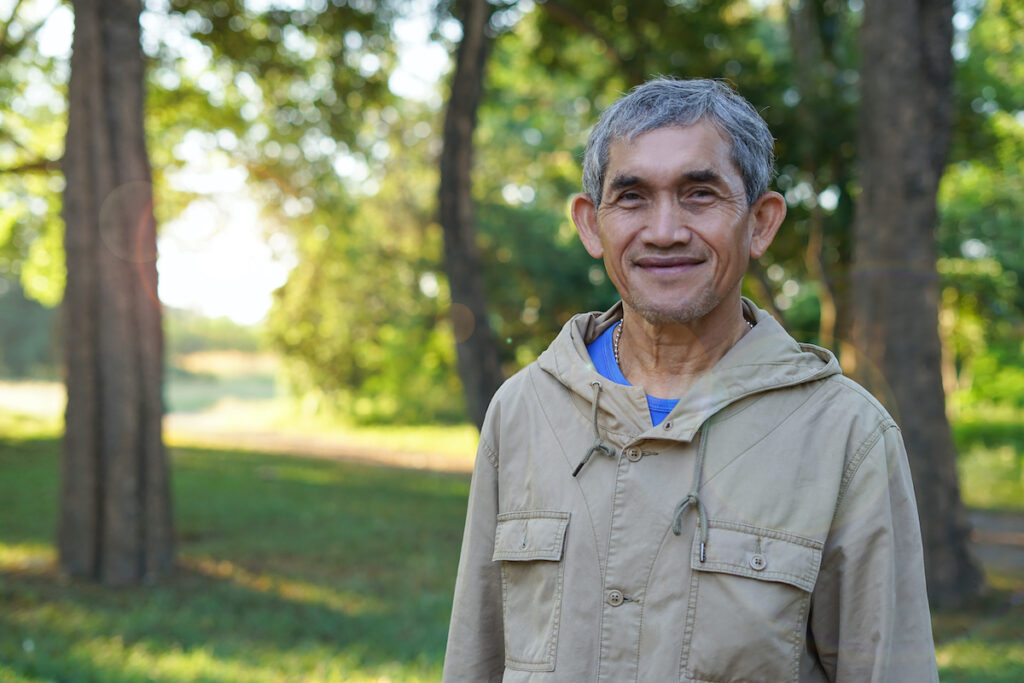
More than 670,000 people in the UK act as unpaid caregivers for a person with dementia, saving the economy about £11 billion each year (Alzheimer’s Society, 2014). The number of people living with dementia is estimated to be 850,000 in the UK, predicted to rise to 1.6 million by 2040 (Alzheimer’s Society, 2021). It’s important therefore to understand the impact that caring for a person with dementia has on wellbeing.
Caring for a person with dementia carries a significant burden to the caregivers wellbeing: significantly higher symptoms of depression and anxiety (Ma et al., 2018), and worse quality of life (Karg et al., 2018) than the general population. Providing appropriate support for caregivers is essential to reduce the level of distress experienced by both carers and people with dementia.
A recent approach to support caregivers has been to improve interactions through sensory awareness and exchange (McCormack et al., 2017). This means that arts-based interventions involving techniques like movement and music may be beneficial. There is qualitative support in the literature for this, although quantitative studies do not demonstrate significant effects (Burnside et al., 2017; Camic et al., 2013; Gross et al., 2015; Fraser et al., 2015).
McManus and colleagues (2021) investigated this issue in their research. Their primary aim was to determine the feasibility and acceptability of the multi-modal performing arts intervention programme (MPAI) for caregivers of people with mild-moderately severe dementia. Their secondary objective was to examine how the MPAI might change caregiver burden, caregiver resilience, and perceived quality of life for care recipients.

This mixed methods study looked the feasibility and acceptability of a new performing arts intervention designed for people with dementia and their carers.
Methods
The authors adopted a mixed-methods design. 32 caregivers of people with dementia (PwD) completed quantitative measures across five time points. The questionnaires included: Zarit Burden Interview (caregiver burden); Brief Resilience Scale (resilience); Quality of Life Alzheimer’s Disease (care recipient quality of life). Feasibility was measured through withdrawal and attendance analysis.
The primary investigator conducted semi-structured interviews with 15 caregivers to understand acceptability and experiences. Observations by the primary investigator were integrated into the analysis. Thematic analysis was used.
Participants were recruited through self-referral or from the PwD’s physician. PwD inclusion criteria: live in the community, mild-moderately severe dementia (FAST score), 65 years and older, and ability to travel to the programme. Caregiver inclusion criteria: primary unpaid caregiver, not displaying symptoms of emotional, cognitive or mental impairment, ability to travel to the programme, 18 years or older, access to a phone, and agreeing to participate in all study aspects.
The multi-modal performing arts intervention
The intervention lasted for eight weeks, involving weekly one-hour classes using activities to enrich the mind and body. Two trained facilitators with experience in performing arts conducted the sessions. The classes included stretching, singing and movement, and finished with expressions of gratitude. Caregivers were provided with handouts with instructions for optional at-home activities.
Results
32 dyads completed all five surveys, and 11 were interviewed. The demographic data showed that 60% of caregivers were aged 61-80; 84.4% female; 84.4% white; 78.1% spouses of the care recipients.
Wilcoxon signed ranks tests showed that caregiver burden (ZBI score) significantly declined from baseline (mean=21.44) through to follow-up (mean=19.00). Caregiver resilience (BRS) and care recipient quality of life (QOL-AD) did not significantly change. Scores trended upwards during the intervention, and decreased at the end. Feasibility data showed that 37% of participants withdrew from the study. 12 of the 32 dyads attended every session, and 20 missed one or two.
It’s important to mention that the interviews conducted with the participants showed good acceptability of the arts intervention. Caregivers included advantages like transport provided, class time options, and new stimulation. Barriers to acceptability identified were the health of both participants, stress of getting the PwD to the venue, and a sense of loss when the programme ended.
I was sad that it ended. I can tell you that if you contacted every person in our class, they would all want to go back.
From the qualitative data, a few themes emerged including:
Structured social participation
This was the strongest theme to emerge. Participants felt that structured social participation normalised their experience, and brought a sense of community.
I was in a room of other people in my situation, and I found that somehow comforting, uplifting.
Respite from dependency
Participants felt that the classes gave the opportunity to recuperate from the stress of their caring role.
One of the benefits of the class is it takes the pressure off the caregiver.
Care recipient wellbeing
The classes gave both caregiver and care recipient relief and enjoyment.
I remember one session where we danced together, you know, we haven’t done that in a long time.

The results of this study demonstrate the acceptability of a multi-modal performing arts intervention programme for dementia caregivers.
Conclusions
McManus and colleagues (2021) assessed the multi-modal performing arts intervention (MPAI) programme for people with dementia (PwD) and caregivers. Using a mixed-methods design, quantitative data demonstrated a significant decrease in caregiver burden throughout the intervention, and qualitative data indicated good acceptability. Despite some methodological limitations, this is a good indication of the acceptability of arts-based interventions for carers. As unpaid carers are currently saving the government billions of pounds at the expense of their wellbeing, it is important for these interventions to be invested in, evaluated further and made accessible to our unsung heroes.

The multi-modal performing arts intervention is a promising new intervention including stretching, singing, movement, and expressions of gratitude that has the potential to reduce the burden for caregivers of people with dementia.
Strengths and limitations
The study design is a strength. The qualitative approach allows for an in-depth understanding of caregivers’ experience of the MPAI programme, which is important for its development. The quantitative approach has provided preliminary evidence of the value of arts-based intervention, previously lacking in the field. For the MPAI programme, I particularly enjoyed the novelty of the intervention by adding multiple components to it. Having this variety in performing arts techniques is unique, as often arts-based interventions use one particular strand, like dementia choirs.
There are some methodological limitations. The small sample size and lack of a control group means the results should be interpreted with caution and requires follow-up, as the authors acknowledge. This is a feasibility and acceptability study, so cannot demonstrate the safety and efficacy of this intervention.
The results may be subject to observer bias, as the primary investigator used their own observations to contribute to the analysis. Future research would benefit from independent observers to ascertain user-experiences.
The inclusion criteria for PwD was broad (mild-moderately severe). The impact on daily life for PwD and carers varies significantly depending on stage of progression, such as behaviour and emotional changes (Alzheimer’s Society, 2020; Aoun et al., 2018). This would suggest that scores on questionnaires, such as caregiver burden, may vary depending on stage of progression. Although this was important for sample size as this is a hard-to-reach population, future research may benefit from understanding the relationship between stage of progression and experiences of the intervention, as this may lead to valuable adaptations.

The novelty of the multiple components in this performing arts programme evaluated was a particular strength, while the methodological limitations open future research paths to explore.
Implications for practice
Arts-based interventions may be successful for reducing burden for caregivers of people with dementia (PwD). As caregiver’s wellbeing is often compromised (Ma et al., 2018; Karg et al., 2018), increasing the availability and accessibility of such interventions is an important consideration for the health and social care sector. This may reduce healthcare costs and utilisation for carers, as caregiver burden is associated with poor psychological and physical health (Lethin et al., 2017; Rahman et al., 2019). Therefore, this could influence policy making, and lead to developments to the carer’s assessment practices conducted by local authorities to ensure that caregiver burden is comprehensively assessed and reduced, such as encouraging community-based programmes to enhance wellbeing.
This study could also inform clinical practice. In particular, the findings may influence community psychology, supporting the use of more creative interventions across the lifespan. Arts-based interventions importantly utilise the strengths of the caregiver and the people with dementia to promote wellbeing. Instead of narrowly focusing on the disease, which can increase feelings of stigma, this encourages a person-centred approach to live well with dementia.
Lastly, the study also has implications in terms of intervention delivery. In the context of COVID-19 and this population being clinical vulnerable, in addition to identified barriers to access being transport to the venue, it would be important to develop the programme virtually. This would increase the programme’s scalability. A video platform may reduce the sense of community that was recognised by participants, and therefore adaptation should not be the only format option.

Arts-based interventions should be integrated into treatment plans, which would benefit the health and social care systems.
Statement of interest
None.
Links
Primary study
McManus, K., Tao, H., Jennelle, P., Wheeler, J., & Anderson, G. (2021). The effect of performing arts intervention on caregivers of people with mild to moderately severe dementia. Aging & Mental Health, 26, 1-10.
Other References
Alzheimer’s Society (2014). Alzheimer’s Society’s view on carer support.
Alzheimer’s Society (2020). The progression and stages of dementia.
Alzheimer’s Society (2021). Facts for the media.
Aoun, S. M., Toye, C., Slatyer, S., Robinson, A., & Beattie, E. (2018). A person-centered approach to family carer needs assessment and support in dementia community care in Western Australia. Health & Social Care in the Community, 26, e578–e586.
Brown, K. W., Coogle, C. L., & Wegelin, J. (2016). A pilot randomized controlled trial of mindfulness-based stress reduction for caregivers of family members with dementia. Aging & Mental Health, 20, 1157–1166.
Burnside, L. D., Knecht, M. J., Hopley, E. K., & Logsdon, R. G. (2017). Conceptual model of the impact of an experiential arts program on persons with dementia and their care partners. Dementia (London, England), 16, 29–45.
Camic, P. M., Williams, C. M., & Meeten, F. (2013). Does a ‘Singing Together Group’ improve the quality of life of people with a dementia and their carers? A pilot evaluation study. Dementia (London, England), 12, 157–176.
Fraser, K. D., O’Rourke, H. M., Wiens, H., Lai, J., Howell, C., & Brett-MacLean, P. (2015). A scoping review of research on the arts, aging, and quality of life. The Gerontologist, 55, 719–729.
Gross, S. M., Danilova, D., Vandehey, M. A., & Diekhoff, G. M. (2015). Creativity and dementia: Does artistic activity affect well-being beyond the art class? Dementia (London, England), 14, 27–46.
Karg, N., Graessel, E., Randzio, O., & Pendergrass, A. (2018). Dementia as a predictor of care-related quality of life in informal caregivers: A cross-sectional study to investigate differences in health-related outcomes between dementia and non-dementia caregivers. BMC Geriatrics, 18, 1–9.
Lethin, C., Renom-Guiteras, A., Zwakhalen, S., Soto-Martin, M., Saks, K., Zabalegui, A., … Karlsson, S. (2017). Psychological well-being over time among informal caregivers caring for persons with dementia living at home. Aging & Mental Health, 21, 1138–1146.
Ma, M., Dorstyn, D., Ward, L., & Prentice, S. (2018). Alzheimer’s disease and caregiving: A meta-analytic review comparing the mental health of primary carers to controls. Aging & Mental Health, 22, 1395-1405.
McCormack, L., Tillock, K., & Walmsley, B. D. (2017). Holding on while letting go: Trauma and growth on the pathway of dementia care in families. Aging & Mental Health, 21, 658–667.
Qiu, D., Hu, M., Yu, Y., Tang, B., & Xiao, S. (2019). Acceptability of psychosocial interventions for dementia caregivers: A systematic review. BMC Psychiatry, 19, 1-14.
Rahman, A., Anjum, R., & Sahakian, Y. (2019). Impact of caregiving for dementia patients on healthcare utilization of caregivers. Pharmacy, 7, 138.
Wilz, G., Meichsner, F., & Soellner, R. (2017). Are psychotherapeutic effects on family caregivers of people with dementia sustainable? Two-year long-term effects of a telephone-based cognitive behavioral intervention. Aging & Mental Health, 21, 774–781.
Photo credits
- Photo by wudan3551 on Unsplash
- Photo by Debby Hudson on Unsplash
